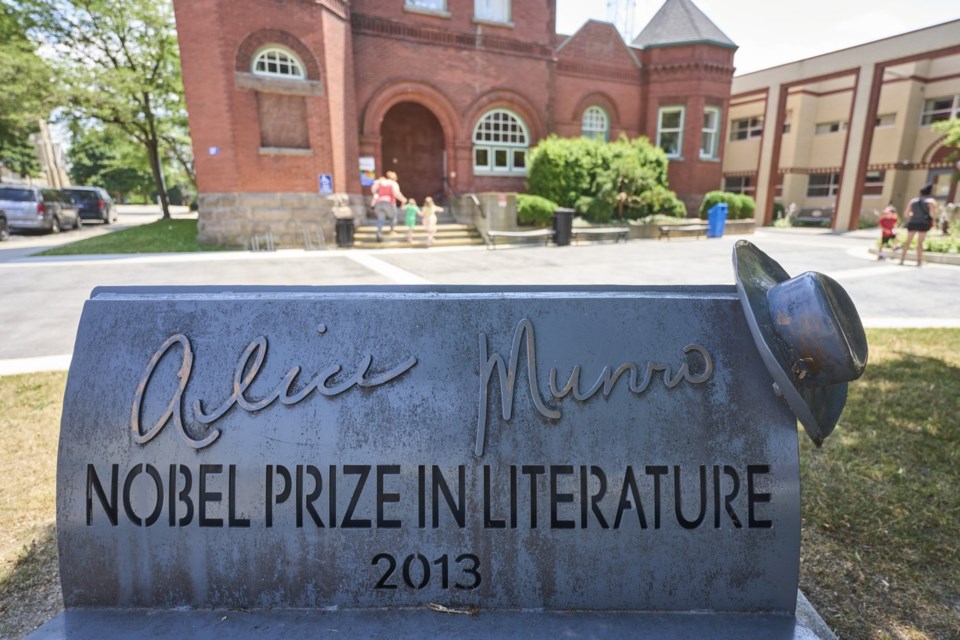CLINTON, ONT. — For the mayor of the municipality where Alice Munro spent much of her adult life, the monument honouring her outside the local library should be left unchanged – an affirmation that for Clinton, Ont., the Nobel laureate will always be considered a cherished member of the community.
But Jim Ginn, the mayor of Central Huron, conceded that he would consider amending the installation if public outcry mounted following recent stunning revelations that Munro chose to remain married to her second husband after learning he had sexually abused her daughter.
"It was shocking," said Ginn, when asked about the disclosures made on Sunday by Andrea Robin Skinner, Munro's daughter with her first husband, James Munro.
Writing in the Toronto Star, Skinner said her stepfather Gerald Fremlin sexually assaulted her in the mid-1970s — when she was nine — and continued to harass and abuse her until she became a teenager. Skinner wrote that in her 20s she told her mother, who died earlier this year, about Fremlin's abuse but that it stayed a secret for decades.
Fremlin was convicted of indecent assault in 2005, at age 80, at a court in Goderich, Ont., 20 kilometres from Clinton.
Alice Munro and Fremlin lived together in Clinton until Fremlin's death in 2013, the same year Munro won the Nobel Prize in literature, the only Canadian writer to ever earn the award.
"I think her legacy is always going to be her unique ability to write stories," Ginn said, adding that "in the end that is how we will remember her.”
The two-piece monument outside the library in Clinton includes a metal bench acknowledging Munro's Nobel win and a coffee table with four of her book titles stacked on top.
In an interview with The Canadian Press, Ginn said he couldn't foresee making changes to the structure in light of the recent revelations, because Munro will always remain "a Nobel Prize winner."
But if faced with growing calls for a change after what has now been made public, “then we would consider it,” he said.
The mayor also praised Skinner for speaking out but hoped the revelations would not tarnish Munro's literary achievements.
"I hope she is able to heal from those wounds of the past," he said of Skinner. "And I hope Alice maintains her legacy and her high esteem in the literary world."
Munro spent her final years away from Clinton. Ginn said there were times, before her departure, that passing her on the street could stir excitement.
"Disbelief, you know, that someone from a small town of 3,000 people could be a Nobel Prize winner, and walk the street and say hi to you," he said.
Days after Skinner's story became public, few people in Clinton were prepared to discuss Munro. Some said they had read the revelations made public by Skinner, but declined to comment on them.
That included Jim Wallace, the blacksmith who made the monument honouring Munro in Clinton.
He described himself as a friend of the family and was not comfortable speaking about the abuse detailed by Skinner, out of respect for Munro.
"I remember Alice as СŔ¶ĘÓƵ a very creative person, a very loving person, so I can't talk about those allegations," he said in an interview, while noting that his monument to her "should last for quite a while," as it consists of galvanized, coated steel.
Karen Philips, a longtime Clinton resident, said she would often see Munro walking on the street but that she rarely interacted with others.
"She was a very nice lady, very well dressed, very confident in herself, and you see her going in the stores, and not acting like she is somebody special, just a normal person," she said.
For Philips, Munro’s legacy remains intact.
“It must have been awful for (Skinner) but that is all I can say," she said. "I don’t think anything less of (Munro)."
Munro was born 35 km away from Clinton in Wingham, Ont., where a memorial garden honouring her opened in 2002. The tiled garden includes the sculpture of a girl, her nose buried in a book.
Passing by on Tuesday, Brenda Johnston-Hanna recalled reading Munro's stories while attending high school in Wingham.
She said the abuse revelations "will have an effect with Alice's reputation," but she did not support any changes to the town's monument.
"They put up the memorial mostly because of her writing," she said.
This report by The Canadian Press was first published July 9, 2024.
Sharif Hassan, The Canadian Press




